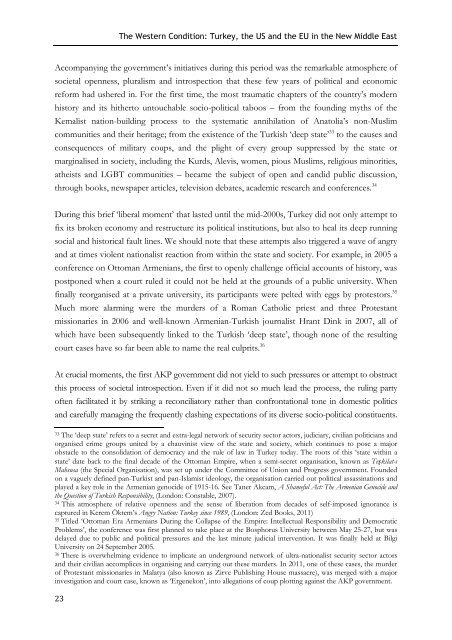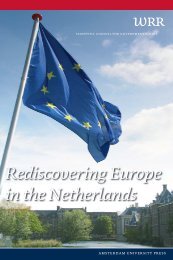The Western Condition - St Antony's College - University of Oxford
The Western Condition - St Antony's College - University of Oxford
The Western Condition - St Antony's College - University of Oxford
Create successful ePaper yourself
Turn your PDF publications into a flip-book with our unique Google optimized e-Paper software.
<strong>The</strong> <strong>Western</strong> <strong>Condition</strong>: Turkey, the US and the EU in the New Middle East<br />
Accompanying the government’s initiatives during this period was the remarkable atmosphere <strong>of</strong><br />
societal openness, pluralism and introspection that these few years <strong>of</strong> political and economic<br />
reform had ushered in. For the first time, the most traumatic chapters <strong>of</strong> the country’s modern<br />
history and its hitherto untouchable socio-political taboos – from the founding myths <strong>of</strong> the<br />
Kemalist nation-building process to the systematic annihilation <strong>of</strong> Anatolia’s non-Muslim<br />
communities and their heritage; from the existence <strong>of</strong> the Turkish ‘deep state’ 33 to the causes and<br />
consequences <strong>of</strong> military coups, and the plight <strong>of</strong> every group suppressed by the state or<br />
marginalised in society, including the Kurds, Alevis, women, pious Muslims, religious minorities,<br />
atheists and LGBT communities – became the subject <strong>of</strong> open and candid public discussion,<br />
through books, newspaper articles, television debates, academic research and conferences. 34<br />
During this brief ‘liberal moment’ that lasted until the mid-2000s, Turkey did not only attempt to<br />
fix its broken economy and restructure its political institutions, but also to heal its deep running<br />
social and historical fault lines. We should note that these attempts also triggered a wave <strong>of</strong> angry<br />
and at times violent nationalist reaction from within the state and society. For example, in 2005 a<br />
conference on Ottoman Armenians, the first to openly challenge <strong>of</strong>ficial accounts <strong>of</strong> history, was<br />
postponed when a court ruled it could not be held at the grounds <strong>of</strong> a public university. When<br />
finally reorganised at a private university, its participants were pelted with eggs by protestors. 35<br />
Much more alarming were the murders <strong>of</strong> a Roman Catholic priest and three Protestant<br />
missionaries in 2006 and well-known Armenian-Turkish journalist Hrant Dink in 2007, all <strong>of</strong><br />
which have been subsequently linked to the Turkish ‘deep state’, though none <strong>of</strong> the resulting<br />
court cases have so far been able to name the real culprits. 36<br />
At crucial moments, the first AKP government did not yield to such pressures or attempt to obstruct<br />
this process <strong>of</strong> societal introspection. Even if it did not so much lead the process, the ruling party<br />
<strong>of</strong>ten facilitated it by striking a reconciliatory rather than confrontational tone in domestic politics<br />
and carefully managing the frequently clashing expectations <strong>of</strong> its diverse socio-political constituents.<br />
33 <strong>The</strong> ‘deep state’ refers to a secret and extra-legal network <strong>of</strong> security sector actors, judiciary, civilian politicians and<br />
organised crime groups united by a chauvinist view <strong>of</strong> the state and society, which continues to pose a major<br />
obstacle to the consolidation <strong>of</strong> democracy and the rule <strong>of</strong> law in Turkey today. <strong>The</strong> roots <strong>of</strong> this ‘state within a<br />
state’ date back to the final decade <strong>of</strong> the Ottoman Empire, when a semi-secret organisation, known as Teşkilat-ı<br />
Mahsusa (the Special Organisation), was set up under the Committee <strong>of</strong> Union and Progress government. Founded<br />
on a vaguely defined pan-Turkist and pan-Islamist ideology, the organisation carried out political assassinations and<br />
played a key role in the Armenian genocide <strong>of</strong> 1915-16. See Taner Akcam, A Shameful Act: <strong>The</strong> Armenian Genocide and<br />
the Question <strong>of</strong> Turkish Responsibility, (London: Constable, 2007).<br />
34 This atmosphere <strong>of</strong> relative openness and the sense <strong>of</strong> liberation from decades <strong>of</strong> self-imposed ignorance is<br />
captured in Kerem Öktem’s Angry Nation: Turkey since 1989, (London: Zed Books, 2011)<br />
35 Titled ‘Ottoman Era Armenians During the Collapse <strong>of</strong> the Empire: Intellectual Responsibility and Democratic<br />
Problems’, the conference was first planned to take place at the Bosphorus <strong>University</strong> between May 25-27, but was<br />
delayed due to public and political pressures and the last minute judicial intervention. It was finally held at Bilgi<br />
<strong>University</strong> on 24 September 2005.<br />
36 <strong>The</strong>re is overwhelming evidence to implicate an underground network <strong>of</strong> ultra-nationalist security sector actors<br />
and their civilian accomplices in organising and carrying out these murders. In 2011, one <strong>of</strong> these cases, the murder<br />
<strong>of</strong> Protestant missionaries in Malatya (also known as Zirve Publishing House massacre), was merged with a major<br />
investigation and court case, known as ‘Ergenekon’, into allegations <strong>of</strong> coup plotting against the AKP government.<br />
23

















